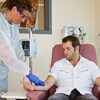Frequent follow-up testing did not improve the survival rate among patients with stage II or III colorectal cancer (CRC), according to a new study published in JAMA. Researchers assessed the effect of more or less frequent follow-up testing after treatment or surgery for CRC.
The trial, which was conducted at 24 centers in Denmark, Sweden and Uruguay, included more than 2,500 patients with stage II or stage III CRC who underwent therapy and surgery. The patients were randomly assigned to have CEA testing (a type of blood test used in the diagnosis of CRC) and computed tomography (CT) of the chest and abdomen at a high frequency, which included tests at 6, 12, 18, 24 and 36 months, or at a low frequency, which included testing at 12 months and 36 months after surgery.
The primary endpoints of this study included a 5-year mortality rate and CRC-related mortality rate, while CRC recurrence was the secondary endpoint.
The results from the COLOFOL trial, pubished in JAMA, found that frequent follow-up testing with CEA and computed tomography didn’t improve patients’ survival compared with less-frequent testing. Among the 2,509 study participants, the 5-year overall patient mortality rate in the high-frequency group was 13.0% compared with 14.1% in the low-frequency group.
The 5-year colorectal cancer-specific mortality rate in the high-frequency group was 10.6% compared with 11.4% in the low-frequency group. The colorectal cancer-specific recurrence rate was 21.6% in the high-frequency group compared with 19.4% in the low-frequency group.







